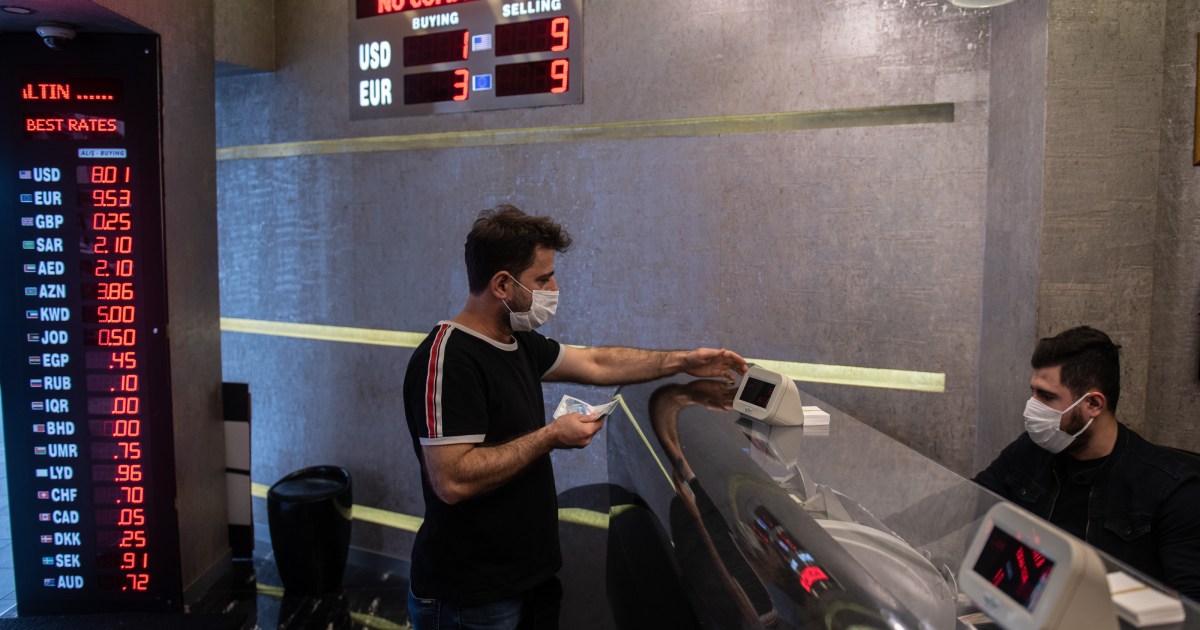After years of significant decline in the value of the Turkish lira, high inflation rates and declining growth rates, recent statements by Turkish President Recep Tayyip Erdogan and the changes that affected the Ministry of Finance and the Central Bank have restored confidence to Turkish investors and markets after the economy was affected by a set of internal and external political and security variables.
The dollar and the euro had recorded record numbers during the past few days, as the former reached 8.5 pounds, while the euro rose to 9.99 pounds.
The price of the lira rose significantly against the dollar after recent decisions and Erdogan's statements, which he described as conciliatory, as it reached 7.66 pounds this evening, Thursday.
In a speech delivered yesterday, the President stressed that the new economic policy provides great opportunities for foreign investors, by relying on 3 basic pillars: price stability, financial stability, and macroeconomic stability.
He announced that his government will launch a new campaign focusing on stability, growth and employment, realizing that a country with a weak economy cannot maintain its gains in other areas, noting that the country's credit risk swap index declined by 50 basis points to 478.
Erdogan said, "We strive to reduce inflation rates to below 10%, and preserve the purchasing power of citizens," explaining that the lira's recovery is an indication that Turkey is on the right path.
In implementation of his statements, the President held a closed meeting today in the capital, Ankara, with the members of the Board of Directors of the International Investors Association (YASED).
Turkey has faced a severe economic and monetary crisis since 2018, which continues to this day, as the lira fell to 6.90 against the dollar at the end of the same year, then its exchange rate rose to 5.85 liras by the end of 2019, then it soon returned to decline this year until it reached Towards 8.50, then started to recover, as it fell below the 8-pound barrier against the dollar.
Positive messages
Economists believe that the sudden departure of the Finance Minister and the President of the Central Bank - the two largest economic policy makers - paves the way for raising interest rates and other measures to strengthen the lira.
In his first statement, the new Central Bank Governor, Naji Aghbal, confirmed the continuation of using all monetary policy tools in line with the main objective of price stability.
"The main objectives of the central bank are to ensure price stability, and in line with the main objective we will use all policy tools decisively," he said, stressing at the same time enhancing communication with monetary policy within the framework of the principles of transparency, accountability and predictability.
And in the first statement of the new Finance Minister, Lotfi Alfan, he promised to implement changes in line with market desires and improve the investment environment for international and local investors, while using all tools to address inflation.
Alfan said: Institutional strengthening is important, fiscal discipline will be maintained through realistic risk management, adding, "The next period will be for recovery, as the effects of the pandemic will diminish and new opportunities form."
Foreign investment
In the context, Khaled Shabib, professor of economics at the University of Rushd Istanbul, told Al-Jazeera Net that the double change that took place at the Ministry of Finance and the Central Bank alike gave a positive message to the market, which led to the appreciation of the lira in light of the continuing talk about gas and oil discoveries in the Black Sea.
He cautioned that the demand for the pound may be a speculative and non-investment process, that is, on the currency’s price only, and that it is intended to absorb the pound at this low price.
Shabib - an advisor to the General Council of Islamic Banks - believes that President Erdogan wants to open more stable relations with strategic foreign investors who enter to establish and expand promising projects for Turkey.
He believes that the solution lies in the moves of the ministries of economy and finance as well as the central bank, with the simultaneous management of foreign investment, in a medium-term plan, with full awareness of the need to block negative speculation roads, and the issuance of easy and uncomplicated legal legislation, because it gives more reassurance, to attract investment The foreigner.
Tough policies
For his part, Mohamed Ibrahim, a researcher at the Aegean University in Izmir, confirmed that the lira has become the best performer among emerging market currencies since Friday, as it regained about 9% of its value, pointing to the difficulty of predicting the direction of the lira now.
But the trend is still recoverable, and any disappointment in the market will come with a counterattack.
He wondered: Will the new central governor be able to bring about change or will there be a setback for the market’s hopes again?
He explained the president’s talk yesterday about starting to endure difficult remedial policies that he will give the green light to raise the interest rate during the coming period, in addition to adopting austerity policies, whether financial or monetary.
Ibrahim told Al-Jazeera Net that supporting the exchange rate, through the injection of foreign currencies, had a very limited impact, unlike raising the interest rate, in addition to the fact that the injection of dollars cost the Central Bank billions of hard currencies.
The researcher concluded by stressing that the economic battle appears to be more difficult than the political battles for a country like Turkey.

